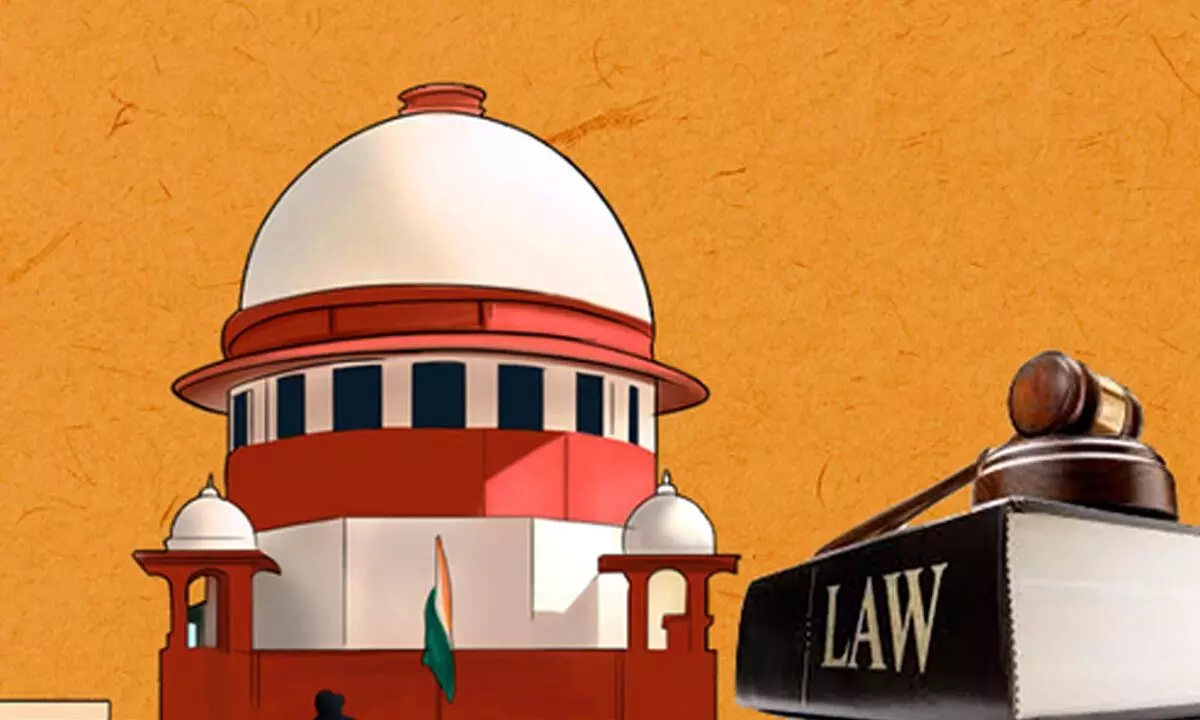Live
- They always want me to win, and now I feel lucky to have been offered a story like ‘Zebra’: Satyadev Kancharana
- ‘Democracy first, humanity first’: PM Modi in Guyana's parliament on two countries' similarities
- PKL Season 11: Telugu Titans register third straight win to top standings
- Is Pollution Contributing to Your COPD?
- NASA Unveils Underwater Robots for Exploring Jupiter's Moons
- Additional Central forces arrive in violence-hit Manipur
- AR Rahman and Saira Banu’s Divorce: Legal Insights into Common Issues in Bollywood Marriages
- 82.7 pc work completed in HPCL Rajasthan Refinery area: official
- Curfew relaxation extended in 5 Manipur districts on Friday
- Tab scam prompts Bengal govt to adopt caution over fund disbursement
Just In

Supreme Court of India
The Centre has opposed a plea filed before the Supreme Court challenging the constitutional validity of certain provisions of the 2019 Muslim Women (Protection of Rights on Marriage) Act, which criminalises pronouncement of triple talaq by Muslim men.
New Delhi: The Centre has opposed a plea filed before the Supreme Court challenging the constitutional validity of certain provisions of the 2019 Muslim Women (Protection of Rights on Marriage) Act, which criminalises pronouncement of triple talaq by Muslim men.
“It was seen that setting aside talaq-e-biddat (triple talaq) by the Supreme Court has not worked as a sufficient deterrent in bringing down the number of divorces by this practice among certain Muslims. (T)he victims of talaq-e-biddat have no option but to approach the police for redressal of their grievances and the police were helpless as no action could be taken against their husbands in the absence of punitive provisions in the law. Therefore, in order to prevent the aforesaid practice, it was felt that there was an urgent need for stringent provisions in the law which act as a deterrent to Muslim husbands divorcing their wives by adopting instantaneous and irrevocable talaq,” said the affidavit filed by the Union Ministry of Law and Justice recently before the apex court.
It said that the practice of talaq-e-biddat legitimised and institutionalised abandonment of wives by their husbands and did not simply result in a private injury but in a public wrong as it militated against the rights of women and the social institution of marriage itself.
The Parliament in its wisdom has enacted the impugned Act to protect the rights of married Muslim women who are being divorced by triple talaq and the law in question helps in ensuring the larger constitutional goals of gender justice and gender equality of married Muslim women, the affidavit added.
The Centre said that the Supreme Court has consistently held that the court cannot go into the wisdom of the measure and cannot enter into a discussion as to what the law should be.
“It is the function of the legislature alone to determine what is and what is not good and proper for the people of the land and they must be given widest latitude to exercise their functions within the limit of their powers else all progress is barred. Defining offences and prescribing appropriate penalties is a core function of the State. Whether or not a particular type of conduct ought to be criminalised, and what punishment is to be imposed for such conduct is to be determined by the legislature in light of the prevailing social circumstances,” the affidavit said.
Further, it said that a similar petition challenging the validity of the Muslim Women (Protection of Rights on Marriage) Ordinance, 2018, which was in similar lines to the impugned Act, was dismissed by the Delhi High Court in September 2018.
In 2017, 'talaq-e-biddat (triple talaq)' was set aside by the Constitution Bench in the case of Shayara Bano Vs. Union of India as it violated the fundamental rights and the rights of equality guaranteed to a woman under the Constitution and suggested the practice be made punishable.
“It is submitted that where the Shayara Bano case itself has held the practice of triple talaq to be manifestly arbitrary, it cannot be argued that a law criminalising the practice is manifestly arbitrary,” contended Centre before the Supreme Court, adding that there is no basis to the claim that marriages being under personal law, are exempted from the application of the general criminal law and “marriages are a social institution in which the State has a special interest in protecting.”
The plea filed before the Supreme Court argued that since the practice of triple talaq has no legal effect after the Shayara Bano case, it cannot be criminalised.

© 2024 Hyderabad Media House Limited/The Hans India. All rights reserved. Powered by hocalwire.com






